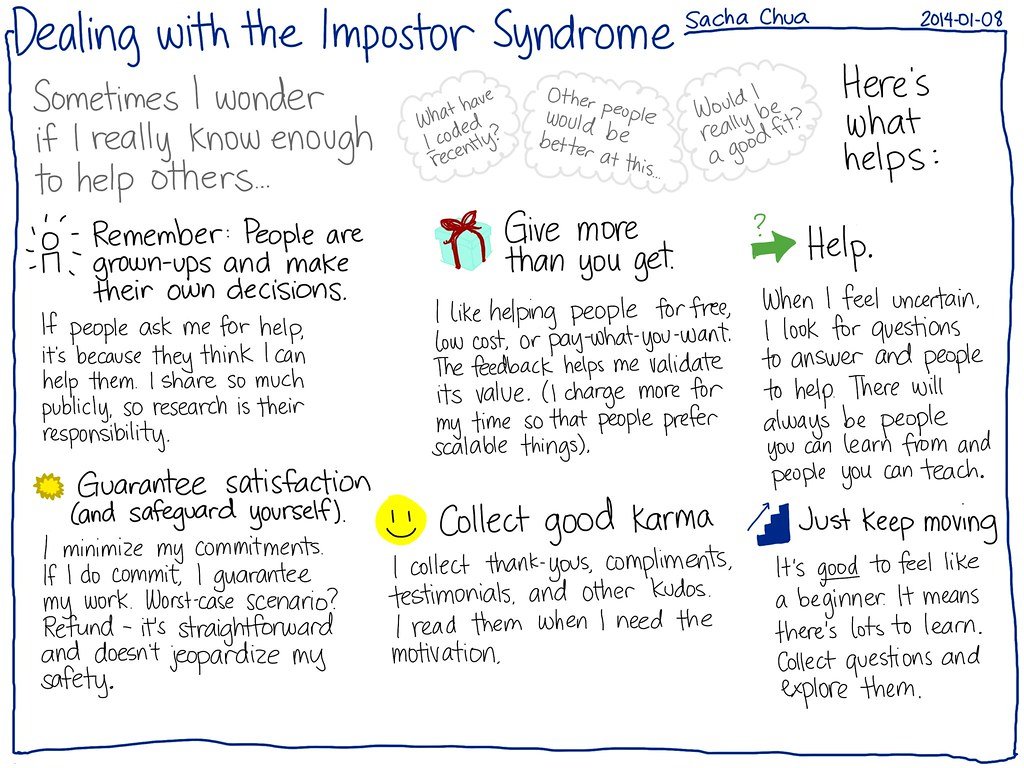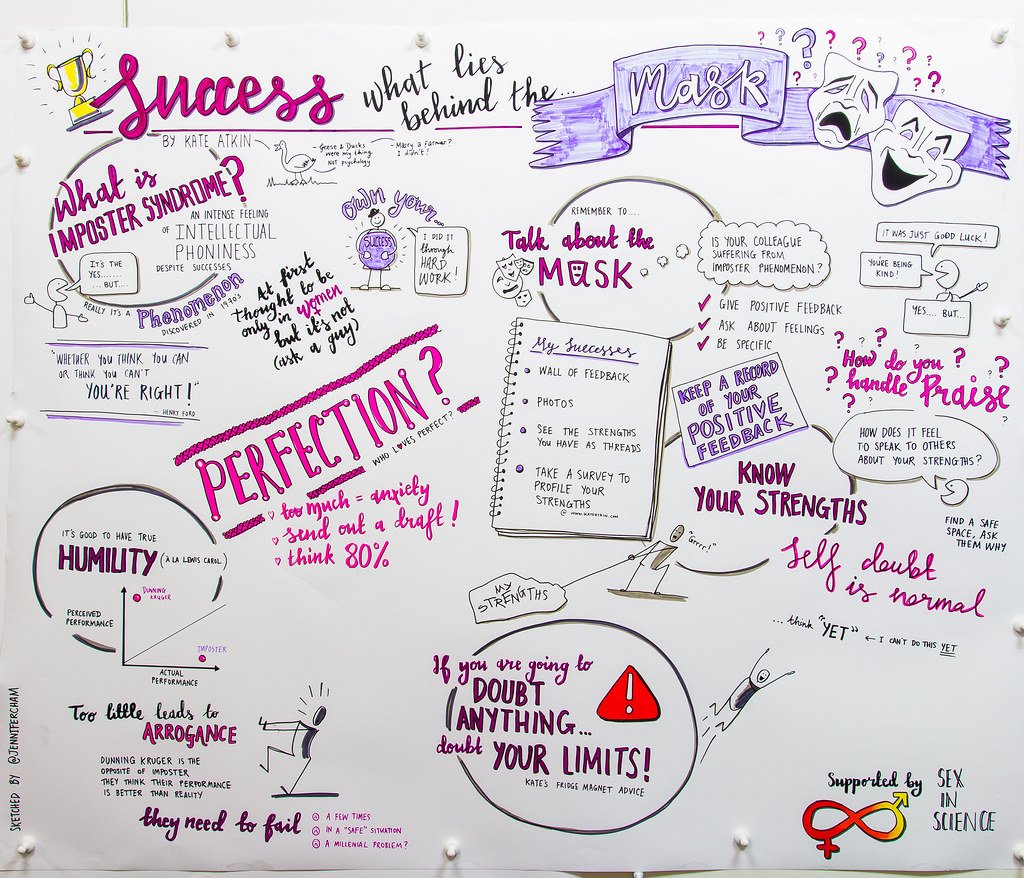Do you ever find yourself questioning your abilities, feeling like a fraud, or constantly worrying that you’ll be exposed as an imposter in your remote work? If so, you’re not alone. Imposter syndrome, that nagging self-doubt that undermines our confidence, can be particularly challenging in the context of remote work. Without the physical presence of colleagues or the familiar office environment, it’s easy to feel isolated and question whether we truly belong. But fear not! In this article, we’ll explore effective strategies to conquer imposter syndrome and thrive in your remote work journey. So, grab a cup of coffee, find a cozy spot, and let’s dive into the empowering world of overcoming imposter syndrome in remote work.
Table of Contents
- Understanding Imposter Syndrome in Remote Work
- Recognizing the Signs and Symptoms of Imposter Syndrome
- Strategies to Overcome Imposter Syndrome in Remote Work
- Building Confidence and Self-Worth in a Remote Work Environment
- Seeking Support and Embracing Vulnerability in Remote Work
- Q&A
- The Way Forward

Understanding Imposter Syndrome in Remote Work
Working remotely has become increasingly popular in recent years, offering flexibility and convenience for employees. However, along with the benefits come unique challenges, one of which is the phenomenon known as Imposter Syndrome. This psychological pattern can affect remote workers, causing them to doubt their abilities and feel like frauds in their professional roles.
Imposter Syndrome in remote work can manifest in various ways. Some individuals may constantly question their competence, fearing that they will be exposed as inadequate. Others may downplay their achievements, attributing their success to luck or external factors. These feelings of self-doubt can be particularly amplified in remote work settings, where there is less direct interaction and validation from colleagues.
To combat Imposter Syndrome in remote work, it is important to recognize and address these negative thoughts and feelings. Here are some strategies that can help:
- Self-reflection: Take time to reflect on your accomplishments and acknowledge your skills and expertise. Remind yourself of the value you bring to your work.
- Seek support: Reach out to colleagues, mentors, or friends who can provide encouragement and reassurance. Sharing your experiences and concerns can help alleviate feelings of isolation.
- Set realistic expectations: Understand that nobody is perfect and that making mistakes is a natural part of the learning process. Embrace challenges as opportunities for growth.
- Celebrate achievements: Instead of dismissing your accomplishments, celebrate them. Give yourself credit for your hard work and achievements, no matter how small they may seem.
- Practice self-care: Take care of your physical and mental well-being. Engage in activities that help you relax and recharge, such as exercise, meditation, or hobbies.
By understanding and addressing Imposter Syndrome in remote work, individuals can cultivate a healthier mindset and thrive in their professional endeavors.

Recognizing the Signs and Symptoms of Imposter Syndrome
Imposter Syndrome, also known as the “fraud phenomenon,” is a psychological pattern in which individuals doubt their accomplishments and have a persistent fear of being exposed as a fraud. It can affect anyone, regardless of their achievements or qualifications. is crucial in order to address and overcome these feelings of self-doubt.
Here are some common signs that may indicate you are experiencing Imposter Syndrome:
- Self-doubt: Constantly questioning your abilities and feeling like you don’t deserve your success.
- Attributing success to luck: Believing that any achievements or accomplishments are solely due to external factors, rather than your own skills or efforts.
- Fear of failure: Being terrified of making mistakes or failing, to the point where it hinders your progress and prevents you from taking on new challenges.
- Overworking: Feeling the need to constantly prove yourself, leading to excessive work hours and burnout.
- Discounting praise: Dismissing compliments or positive feedback from others, believing they are just being polite or mistaken.
It’s important to remember that experiencing Imposter Syndrome doesn’t mean you are inadequate or lacking in skills. It is a common phenomenon that affects many high-achieving individuals. By recognizing these signs and understanding that you are not alone, you can take steps to overcome Imposter Syndrome and regain confidence in your abilities.

Strategies to Overcome Imposter Syndrome in Remote Work
Imposter syndrome can be a common challenge for remote workers, as the lack of face-to-face interaction and constant self-evaluation can amplify feelings of self-doubt. However, there are several effective strategies that can help you overcome imposter syndrome and thrive in your remote work environment:
- Recognize your achievements: Take a moment to reflect on your accomplishments and acknowledge your skills and expertise. Keep a list of your achievements and revisit it whenever self-doubt creeps in. Remind yourself that you have earned your place in the remote work world.
- Connect with a support network: Reach out to fellow remote workers or join online communities where you can share your experiences and concerns. Having a support network can provide valuable perspective and reassurance, reminding you that you are not alone in your feelings.
- Practice self-compassion: Be kind to yourself and treat yourself with the same understanding and compassion you would offer to a friend. Celebrate your strengths and accept that making mistakes is a natural part of growth. Embrace a growth mindset and focus on continuous learning and improvement.
- Set realistic goals: Break down your tasks into manageable chunks and set achievable goals. By setting realistic expectations for yourself, you can avoid feeling overwhelmed and reduce the likelihood of imposter syndrome creeping in. Celebrate each milestone you reach along the way.
- Seek feedback and mentorship: Reach out to your colleagues or supervisors for feedback on your work. Constructive feedback can help you gain a better understanding of your strengths and areas for improvement. Consider finding a mentor who can provide guidance and support as you navigate your remote work journey.
Remember, imposter syndrome is a common experience, and you are not alone in facing it. By implementing these strategies and cultivating a positive mindset, you can overcome imposter syndrome and thrive in your remote work environment.
Building Confidence and Self-Worth in a Remote Work Environment
Working remotely can be a rewarding experience, but it also comes with its own set of challenges. One of the biggest hurdles is maintaining confidence and self-worth when you’re not physically surrounded by colleagues and supervisors. However, with a few strategies and mindset shifts, you can build and nurture your confidence in a remote work environment.
1. Set clear goals: Start each day by setting clear, achievable goals for yourself. This will give you a sense of purpose and direction, boosting your confidence as you accomplish each task. Break down larger projects into smaller, manageable tasks to stay motivated and focused.
2. Celebrate your wins: Take the time to acknowledge and celebrate your achievements, no matter how small they may seem. Whether it’s completing a challenging project or mastering a new skill, give yourself a pat on the back. Recognizing your accomplishments will reinforce your self-worth and keep you motivated.
3. Seek feedback and support: Just because you’re working remotely doesn’t mean you have to navigate the journey alone. Reach out to your colleagues or supervisors for feedback and guidance. Constructive criticism can help you grow and improve, while positive feedback will boost your confidence. Additionally, consider joining online communities or networking groups to connect with like-minded professionals who can offer support and encouragement.
Remember, building confidence and self-worth is an ongoing process. Embrace the challenges of remote work and use them as opportunities for personal growth. By setting goals, celebrating your wins, and seeking feedback, you’ll thrive in a remote work environment and feel confident in your abilities.
Seeking Support and Embracing Vulnerability in Remote Work
Working remotely can be both liberating and challenging. While it offers flexibility and freedom, it can also lead to feelings of isolation and vulnerability. In order to thrive in this new work environment, it is crucial to seek support and embrace vulnerability.
One way to seek support is by building a strong virtual community. Connect with colleagues through online platforms and create a space where you can share experiences, challenges, and successes. This can foster a sense of belonging and provide a support system that is essential for remote workers.
Embracing vulnerability is equally important. Remote work often blurs the boundaries between personal and professional life, making it essential to be open and honest about our struggles. By acknowledging our vulnerabilities, we can create a culture of empathy and understanding within our virtual teams.
Remember, seeking support and embracing vulnerability are not signs of weakness, but rather acts of strength. They allow us to grow both personally and professionally, and ultimately lead to a more fulfilling remote work experience.
Q&A
What is imposter syndrome?
Imposter syndrome refers to the feeling of inadequacy and self-doubt despite evidence of competence and success. It often leads individuals to believe that they are frauds or that their achievements are a result of luck rather than their own abilities.
How does imposter syndrome manifest in remote work?
In remote work, imposter syndrome can be exacerbated due to the lack of face-to-face interactions and the absence of immediate feedback. Without the physical presence of colleagues and supervisors, individuals may question their abilities and feel like they don’t belong in their remote work environment.
What are some signs that indicate someone is experiencing imposter syndrome?
Signs of imposter syndrome in remote work can include constantly seeking validation, downplaying achievements, feeling anxious about making mistakes, and comparing oneself to others. These signs often indicate a lack of self-confidence and a fear of being exposed as a fraud.
How can one overcome imposter syndrome in remote work?
To overcome imposter syndrome in remote work, it is important to acknowledge and challenge negative self-talk, celebrate achievements, seek support from colleagues or mentors, and focus on personal growth rather than perfection. Developing a positive mindset and practicing self-compassion can also be helpful in combating imposter syndrome.
What strategies can be used to build self-confidence in remote work?
Building self-confidence in remote work involves setting realistic goals, recognizing and appreciating one’s strengths, and embracing failures as learning opportunities. Engaging in self-care activities, maintaining a healthy work-life balance, and seeking feedback can also contribute to boosting self-confidence in a remote work setting.
How can remote teams support each other in overcoming imposter syndrome?
Remote teams can support each other in overcoming imposter syndrome by fostering a culture of open communication and empathy. Regular check-ins, virtual team-building activities, and providing constructive feedback can help team members feel valued and supported. Sharing personal experiences and offering reassurance can also create a sense of belonging and reduce feelings of imposter syndrome.
The Way Forward
As we bid adieu to this exploration of conquering the elusive imposter syndrome in the realm of remote work, let us take a moment to reflect on the journey we have embarked upon. We have delved into the depths of self-doubt, navigating the treacherous waters of uncertainty, and emerged stronger, more resilient than ever before.
In the vast expanse of remote work, where the boundaries between personal and professional blur, imposter syndrome can stealthily creep into our minds, casting shadows of doubt upon our abilities. But fear not, for armed with the knowledge and strategies we have uncovered, we are equipped to face this formidable foe head-on.
Remember, dear reader, that you are not alone in this battle. Countless others have grappled with the same insecurities, questioning their worth and fearing exposure. But it is in acknowledging our shared experiences that we find solace and strength. Together, we can shatter the shackles of imposter syndrome and embrace our true potential.
As you navigate the remote work landscape, let self-compassion be your guiding light. Celebrate your achievements, no matter how small, and acknowledge the unique skills and perspectives you bring to the table. Surround yourself with a supportive network, both online and offline, who can uplift and remind you of your worth when doubt threatens to consume you.
Embrace the power of reframing your thoughts, transforming self-doubt into self-belief. Recognize that failure is not a reflection of your abilities, but rather an opportunity for growth and learning. Embrace the discomfort of stepping outside your comfort zone, for it is in these moments that true growth and transformation occur.
And finally, dear reader, remember that overcoming imposter syndrome is not a destination, but an ongoing journey. It is a dance between self-reflection and self-acceptance, a delicate balance that requires patience and perseverance. So, as you embark upon this path, be kind to yourself, for you are deserving of success and fulfillment.
With these tools in your arsenal, go forth and conquer the remote work world with confidence and authenticity. Let the imposter syndrome tremble in the face of your unwavering determination. You are not an imposter, but a force to be reckoned with.
As an affiliate, my content may feature links to products I personally use and recommend. By taking action, like subscribing or making a purchase, you’ll be supporting my work and fueling my taco cravings at the same time. Win-win, right?
Want to read more? Check out our Affiliate Disclosure page.